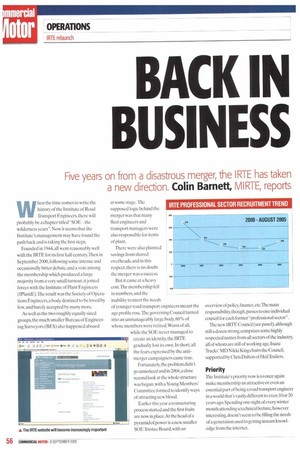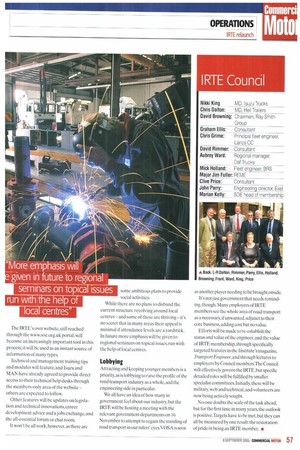BACK IN BUSINESS
Page 56

Page 57

If you've noticed an error in this article please click here to report it so we can fix it.
Five years on from a disastrous merger, the IRTE has taken a new direction. Colin Barnett, MIRTE, reports.
When the time comes to write the history of the Institute of Road Transport Engineers, there will probably be a chapter titled -SOE the wilderness years". Now it seems that the Institute's management may have found the path back and is taking the first steps.
Founded in 1944, all went reasonably well with the IRTE for its first half century.Then in September 2000, following some intense and occasionally bitter debate, and a vote among the membership which produced a large majority from a very small turnout, it joined forces with the Institute of Plant Engineers (IPlantE).The result was the Society of Operations Engineers, a body destined to be loved by few, and barely accepted by many more.
As well as the two roughly equally sized groups,the much smaller Bureau of Engineering Surveyors (BES) also happened aboard at some stage. The supposed logic behind the merger was that many fleet engineers and transport managers were also responsible for items of plant.
There were also planned savings from shared overheads, and in this respect, there is no doubt the merger was a success. 200But it came at a heavy
SOO 600 WO 200
cost.The membership fell in numbers, and the inability to meet the needs of younger road transport engineers meant the age profile rose.The governing Council turned into an unmanageably large body, 60% of whose members were retired. Worst of all, while the SOE never managed to create an identity, the IRTE gradually lost its own. In short, all the fears expressed by the antimerger campaigners came true.
Fortunately, the problem didn't go unnoticed and in 2004,a close second look at the whole structure was begun, with a Young Members' Committee formed to identify ways of attracting new blood.
Earlier this year a restructuring process started and the first fruits are now in place.At the head of a pyramid of power is a new, smaller SOE Trustee Board. with an overview of policy, finance,etc.The main responsibility, though, games to one individual council for each former"professional sector".
The new IRTE Council (see panel), although still a dozen strong, comprises some highly respected names from all sectors of the industry, all of whom are still of working age. lsuzu Trucks' MD Nikki King chairs the Council, supported by Chris Dalton of Heil Trailers.
Priority
The Institute's priority now is to once again make membership an attractive or even an essential part of being a road transport engineer in a world that's vastly different to even 10 or 20 years ago. Spending one night of every winter month attending a technical lecture, however interesting, doesn't seem to be filling the needs of a generation used to getting instant knowledge from the internet. The IRTE's own website, still reached through the www.soe.org.uk portal, will become an increasingly important tool in this process; it will be used as an instant source of information of many types 'Technical and management training tips and modules will feature, and Isuzu and MAN have already agreed to provide direct access to their technical help desks through the members-only area of the website — others are expected to follow.
Other features will be updates on legislation and technical innovations, career development advice and a jobs exchange, and the all-essential forum or chat room, It won't be all work, however,as there are some ambitious plans to provide social activities.
While there are no plans to disband the current structure revolving around local centres—and some of these are thriving — it's no secret that in many areas their appeal is minimal if attendance levels are a yardstick. In future more emphasis will be given to regional seminars on topical issues, run with the help of local centres.
Lobbying
Attracting and keeping younger members is a priority, as is lobbying to raise the profile of the road transport industry as a whole, and the engineering side in particular.
We all have an idea of how many in government feel about our industry, but the IRTE will be hosting a meeting with the relevant government departments on 16 November to attempt to regain the standing of road transport in our rulers' eyes. VOSA is seen as another player needing to be brought onside.
It's not just government that needs reminding,though. Many employers of IRTE members see the whole area of road transport as a necessary, if unwanted, adjunct to their core business, adding cost hut no value.
Efforts will be made to re-establish the status and value of the engineer,and the value of IRTE membership, through specifically targeted features in the Institute's magazine, Transport Engineer, and through lectures to employers by Council members.The Council will effectively govern the IRTE, but specific detailed roles will be fulfilled by smaller specialist committees. Initially, these will be military, web and technical, and volunteers are now being actively sought.
No-one doubts the scale of the task ahead, but for the first time in many years, the outlook is positive.Targets have to be met, but they can all be measured by one result: the restoration of pride in being an IRTE member. •








































































































































































































